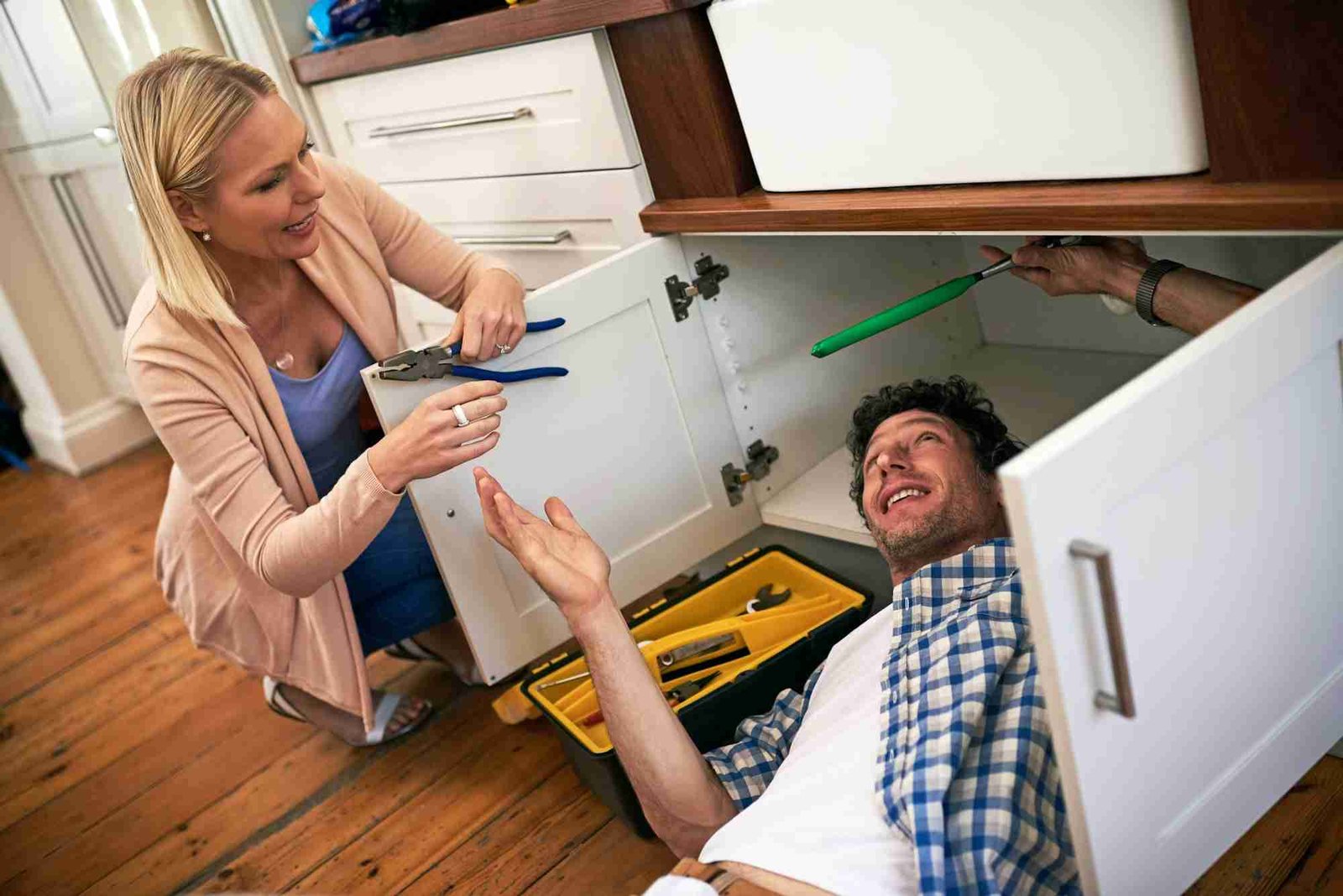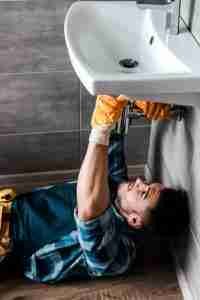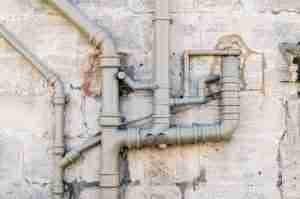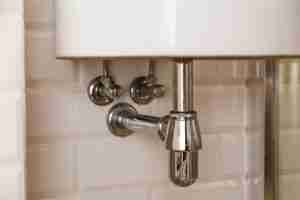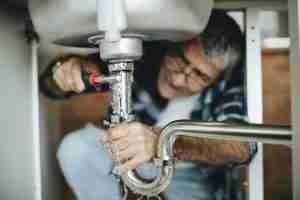Dealing with a burst pipe can be stressful, chaotic, and costly, especially if you’re not prepared. Whether it’s due to the cold weather, old plumbing, or accidental damage, a burst pipe can lead to severe water damage if not handled promptly. In this guide, we’ll walk you through the immediate steps to take, the causes behind pipe bursts, and how you can prevent future occurrences. If you’re dealing with this issue in the Bayside Melbourne area, professional assistance is just a call away.
Immediate steps when a pipe bursts:
1. Turn off the water supply
As soon as you realise a pipe has burst, shut off the water at the main valve. This will stop the flow of water into your home and prevent further damage. The main water shutoff valve is typically located in the front of your house, or where the water line enters your house. It’s a good idea to know where this is before you face an emergency. On the water meter, look for a lever/ handle next to the meter and turn the handle/ lever so it is 90 degrees to the meter (or clockwise as far as it can go). You might need to use gloves or pliers if the handle is tight to ensure the water supply is off.
2. Drain the faucets:
After shutting off the water, open your faucets to drain any remaining water in the pipes. Start with the cold taps, then move on to the hot ones. Draining the water will relieve pressure in the system and reduce the chance of more water leaking from the burst pipe.
3. Shut off the electricity:
If the burst pipe is near electrical outlets or appliances, turn off the electricity to prevent a potential hazard. Water and electricity are a dangerous combination, so it’s important to be cautious.
4. Call a professional for burst pipe repair:
Now that the immediate danger is handled, it’s time to call a professional for burst pipe repair. DIY fixes may work for temporary relief, but a licensed plumber will ensure that the repair is done correctly and safely. If you’re in the Bayside Melbourne area, seek expert help from plumbing specialists to ensure the job is handled professionally.
5. Remove water and protect your belongings:
While waiting for a plumber to arrive, use towels, mops, or even a wet vacuum to remove as much water as possible. Move any furniture or belongings that could be damaged by water to a dry area.
Why do pipes burst?
Understanding why pipes burst can help you take steps to avoid future problems. Several factors can contribute to a burst pipe:
1. Freezing temperatures:
One of the most common reasons for a burst pipe is freezing temperatures. When water freezes, it expands. If the temperature drops low enough, the ice can block the pipe and increase pressure, eventually causing the pipe to burst. This is especially common in areas that experience harsh winters.
2. Old or corroded pipes:
Older homes, especially those with outdated plumbing systems, are more susceptible to burst pipes. Over time, pipes can corrode, weaken, and develop cracks that can lead to bursts. If you have an older home, it might be worth having your plumbing inspected to avoid this issue.
3. Excessive water pressure:
Pipes are designed to withstand a certain level of water pressure. If the pressure exceeds that limit, it can cause pipes to burst. Excessive water pressure can be caused by faulty pressure regulators or clogs that increase the pressure within the pipe.
4. Shifting soil or foundations:
Natural settling of the ground or shifting soil due to construction, earthquakes, or heavy rains can put stress on underground pipes, leading to ruptures. If you’ve recently had work done around your home, keep an eye on your pipes for any signs of damage.
5. Tree root infiltration:
Tree roots are naturally attracted to moisture, and over time, they can grow into the joints or cracks in underground pipes, causing them to burst. This is a particularly common issue in areas with large trees.
How to prevent pipes from bursting:
While some causes of burst pipes are out of your control, there are several things you can do to reduce the risk of a pipe bursting in your home:
1. Insulate your pipes:
In areas prone to cold temperatures, insulating your pipes can be a beneficial precaution. Pipe insulation helps maintain a consistent temperature, preventing the water inside from freezing. Pay special attention to exposed pipes in the roof and exterior walls, as they are most at risk.
2. Monitor water pressure:
As we mentioned earlier, excessive water pressure can cause burst pipes, leading to costly damage. To prevent this, consider installing a water pressure gauge to keep an eye on your home’s pressure and ensure it remains within a safe range. Additionally, hiring a licensed plumber to install a pressure-limiting valve on your water meter can help maintain a consistent pressure of 500 kPa across your household fixtures and waterlines. This setting is ideal, as most tapware and fixtures are typically designed to handle a maximum of 500 kPa, ensuring your plumbing system operates safely and efficiently.
3. Regular maintenance:
Scheduling regular maintenance with a plumbing professional is one of the best ways to prevent pipe bursts. A plumber can inspect your pipes for corrosion, leaks, and other signs of wear and tear that could lead to a burst.
4. Know where your shutoff valves are:
Every homeowner should know where their main water shutoff valve is located. In the event of a burst pipe, turning off the water supply immediately can prevent extensive damage. If you’re not sure where it is, locate it now so you’re prepared in case of an emergency.
5. Keep pipes warm:
During the winter, take steps to keep your pipes warm. Open cabinet doors under sinks to let warm air circulate pipes, especially on exterior walls. Letting faucets drip slightly during extreme cold can also prevent freezing.
6. Upgrade old plumbing:
If your home has older plumbing, it might be time for an upgrade. Newer piping materials, like PEX, are more flexible and resistant to bursting. This could save you a lot of hassle in the long run. If you’re in the Bayside Melbourne area, consider discussing this with local experts who specialize in burst pipe repair.
When to call a professional plumber for burst pipe repair:
Not all burst pipes are immediately obvious. Some leaks may go undetected until you start seeing water damage, hearing strange noises, or noticing low water pressure. If you suspect a burst pipe, don’t delay in calling a professional emergency plumber. A plumber will be able to locate the source of the problem, repair the damaged pipe, and recommend any further actions to prevent future issues.
Professional plumbers can also help with water damage restoration, checking for mold growth, and repairing any structural damage caused by the leak. The sooner you address the problem, the less damage and cost you’ll incur.
A burst pipe can cause significant damage to your home, but by acting quickly and following the steps outlined above, you can minimize the impact. Preventing a burst pipe starts with taking good care of your plumbing system—insulating pipes, monitoring water pressure, and scheduling regular maintenance. And when something does go wrong, don’t hesitate to contact a professional for burst pipe repair. If you live in Bayside Melbourne, local plumbing experts are available to help with fast and reliable service, contact us today.

